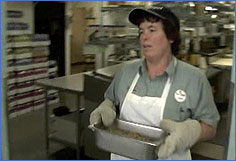

 |

|
|
|
A Seven-Part Series Bundled into Four Television Hours The opening 56-minute episode, “In Sickness and In Wealth,” presents the series’ overarching themes. Each supporting half-hour episode, set in a different ethnic/racial community, provides a deeper exploration of how social conditions affect population health and how some communities are extending their lives by improving them. DVD Chapter Descriptions (PDF) DVD Chapter Times Chart (PDF)
 
In the winter of 2006, the Electrolux Corporation closed the largest refrigerator factory in the U.S. and moved it to Juarez, Mexico, for cheaper labor. The move turned the lives of nearly 3,000 workers in Greenville, Michigan, upside down. Before the plant closed, Electrolux workers led a middle class life—owning homes, buying new cars and taking vacations. Now most are scraping by on severance pay, unemployment benefits and a health plan that will end in a year. As personal finances spiral downward, health follows. In the year after the plant closure, the local hospital’s caseload tripled because of depression, alcoholism and domestic abuse. Experts say that heart disease and mortality are also predicted to rise – totaling 134 “excess” deaths in this area alone over the next 10 years. And the lay-offs not only affect workers but their families and the entire community as well. Psychologist Rick Price, who has studied the effects of job loss on health, explains, “These external life events do get under the skin. They create changes in the way our physiological system operates. They create elevated stressors – stress responses that ultimately lead to both acute and chronic health problems.” High levels of the stress hormone cortisol, for example, can trigger increases in blood pressure, blood sugar, and even inflammation – all risk factors for disease. When stresses just won’t stop – as bills keep coming and there’s no hope for good paid work – the high level of stress hormones puts strain on the body’s organs, eventually wearing them out. Stress also increases the risk of health problems such as alcohol abuse, suicide, homicide, and accidents. As middle-class Americans find their health and way of life increasingly threatened by globalization and corporate profit-seeking, those in the top income brackets are reaping the spoils of our winner-take-all society. The typical CEO now earns more than 250 times the salary of the average worker. Today, the top 1% of the population has more wealth than the bottom 90% combined. Economic inequality is greater now than at any time since the 1920s. In other countries, the situation is vastly different. When Electrolux shut down one of its plants in Vastervick, Sweden, it caused hardly a ripple. Laid-off workers received 80% of their salary in unemployment benefits as well as education and training for new jobs. Electrolux also paid $3 million to stimulate the creation of start-up businesses in Vastervick after pressure from the union and government. The town of Greenville, Michigan, received nothing. Sweden also guarantees its citizens a college education, health care, five weeks of paid vacation, 16 months of paid leave for new parents, and much more. Swedish social policies assume an ethos of shared responsibility and provide a safety net for citizens. Swedes pay more in taxes to support these programs, but they live, on average, three years longer than we do. In America, at least for the time being, workers are left to fend for themselves, and we all pay the price in both health and wealth.
|
|
|||
|